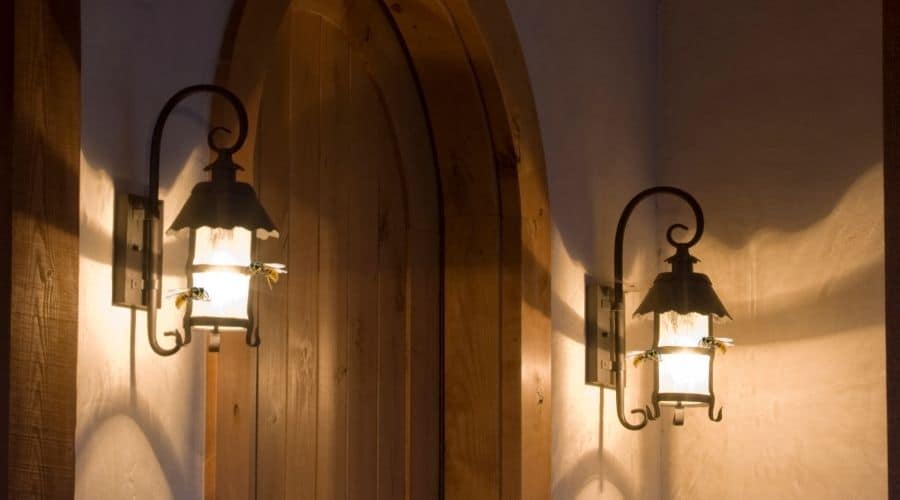Wasps are usually diurnal and sleep at night, so why are wasps often found buzzing around light fixtures in the dark? Artificial lights can mimic the sun causing confusion and providing an easy source of bugs to hunt at the same time.
However, there are also night-flying wasps, and they are also curious about your lights. Why do wasps like light fixtures?
Wasps like light fixtures for the UV and the other insects they can find there to eat. As diurnal insects, wasps are naturally drawn to light because it activates and controls their circadian rhythm and tells them when to sleep and eat.
Table of Contents
Do Wasps Like Light
Wasps love light so much that they seek it out. Not just light fixtures, but the sun, reflected light off of shiny surfaces and bodies of water, and even bioluminescence can grab a wasp’s attention.
Since light indicates the presence of heat, that means these temperature-sensitive insects won’t freeze.
Light means there’s almost certainly food waiting for the wasp. Intriguingly, the wasps you see catching bugs around lights are usually not going to eat those bugs.
According to The UK National History Museum, “Adult wasps don’t eat the prey they kill – they feed it to their young. Social species capture insects, chop them up, and carry parts back to the nest. Some solitary species are more sinister. For example, most spider wasps paralyze arachnid prey using a venomous sting. Their larvae then eat the victim alive.”
Adult wasps are omnivores, and most species eat nectar. The sugars give them lots of energy to fly around.
Since numerous flowers close their petals at night when it gets dark, both memory and light are vital for adult wasps to navigate. Still, light makes it much easier to find prey.
Are Wasps Sensitive To Light
Wasps are sensitive to light. More specifically, wasps are attracted to UV light. Pest control specialists use light to help draw in insects for capture.
Although not all lights put out UV, many do, including LED lights that you find in streetlights and many porch lights.
As Premier LTG points out, “Some in the lighting business have stated that LEDs do not produce UV radiation. However, studies have shown that standard LEDs do create a small amount of UV. That said, the amount of UV they actually emit is even less. This is due to the phosphors within an LED lamp that convert the Ultraviolet light to white light.”
Some creatures see infrared light from the opposite end of the light spectrum well, but not wasps. In fact, they have trouble seeing the red end of the spectrum.
However, these incredible insects see every other color of light, including UV, that humans can’t see, so they pick up on the small amount of UV those LED bulbs put off.
Notably, wasps respond to almost all kinds of lights. However, if there’s a fire, the wasps will shy away from it. The smoke from campfires and backyard barbecues is well known to help repel insects, including wasps.
Not only does smoke mean there’s less oxygen to breathe, it often carries toxins and ash. Plus, wasps like warmth, but they understand fire will burn them.
Are Wasps Attracted To Light At Night
Wasps are attracted to light at night. Any bright light will usually get the attention of wasps, especially when it’s dark, since they use vision more often than memory to navigate.
Unfortunately, wasps love of bright lights can mean bad news for you at home.
There are around thirty thousand known species of wasps. Most wasps are diurnal, but a few exhibit night flying abilities and there are even a couple that are nocturnal. However, both types of wasp can be drawn to artificial light.
Insects aren’t picky about the light source, and more importantly, they have no real sense of personal space.
Worse still, a human home probably smells delectable to wasps since we are made of meat, attract other insects, and often use floral-based fragrances.
As a result, a human house is a great place to stop and look for food or a place to build a new nest.
If you leave the lights on, make sure you close up any windows or other gaps where wasps might come inside. Otherwise, they’ll take it as an invitation and accept.
Are Wasps Attracted To Blue Light
Wasps are attracted to blue light and the blue-to-ultraviolet end of the color spectrum in general. At night blue-white light is far more likely to draw in insects like moths and wasps than a red or orange glow.
Meanwhile, wasps use the blue end of the light spectrum for a unique daytime trick.
Ultraviolet light has the shortest wavelength on the blue end of the light spectrum. Like bees, wasps can navigate based on patterns of UV light they see on flowers and plants.
Although this extreme end of the color spectrum is invisible to you and me, wasps can spot it easily. Additionally, they may use this super-blue light to spot spiders, and other insects to prey on as many species reflect UV.
Helpful Tips To Know About Why Wasps Like Light Fixtures
Light fixtures are an effortless place for wasps to find snacks, especially if they can get inside and grab recently dead bugs who failed to escape. Not only are light fixtures easy to find, but they draw in other curious insects for the wasps to feed on.
Here are more helpful tips to know about why wasps like light fixtures.
- It’s a common misconception that wasps can’t come out at night. Wasps will emerge from their nest if you disturb them. Even daylight-loving wasps will fly and sting if they feel under threat. More alarmingly, the sting they give intruders has a pheromone to help other wasps from the nest locate the problem, so they can follow and attack you by scent as well.
- In addition to their ultraviolet vision, wasps use their heightened sense of smell to scope out possible prey items. This is why wasps come buzz around humans. We are far too large for them, but we smell like the meat we’re made from. It’s enough to get their attention even if they quickly realize we’re not a manageable meal.
- The easiest way to keep wasps out of your light fixtures is to seal them up. Open-sided fixtures usually don’t collect as many large dead bugs like wasps because they can easily fly away. Shop carefully. Choose enclosed light fixtures and carefully reseal any gaps.
Final Thoughts
A wasp’s sense of light and color is incredible. Interestingly, wasps have trouble seeing the red end of the light spectrum.
These surprisingly complex insects are attracted to light yet smart enough to avoid fire.
Whether they are using light to spot their personal landmarks on the petals of flowers on a spring afternoon or navigating to your porch by memory at night for some easy pickings around the light fixture, wasps need ultraviolet light to thrive.
Humans may not see it, but even the tiny amount of UV from an LED bulb is enough to grab a wasps attention and bring it flying to your fixtures.

